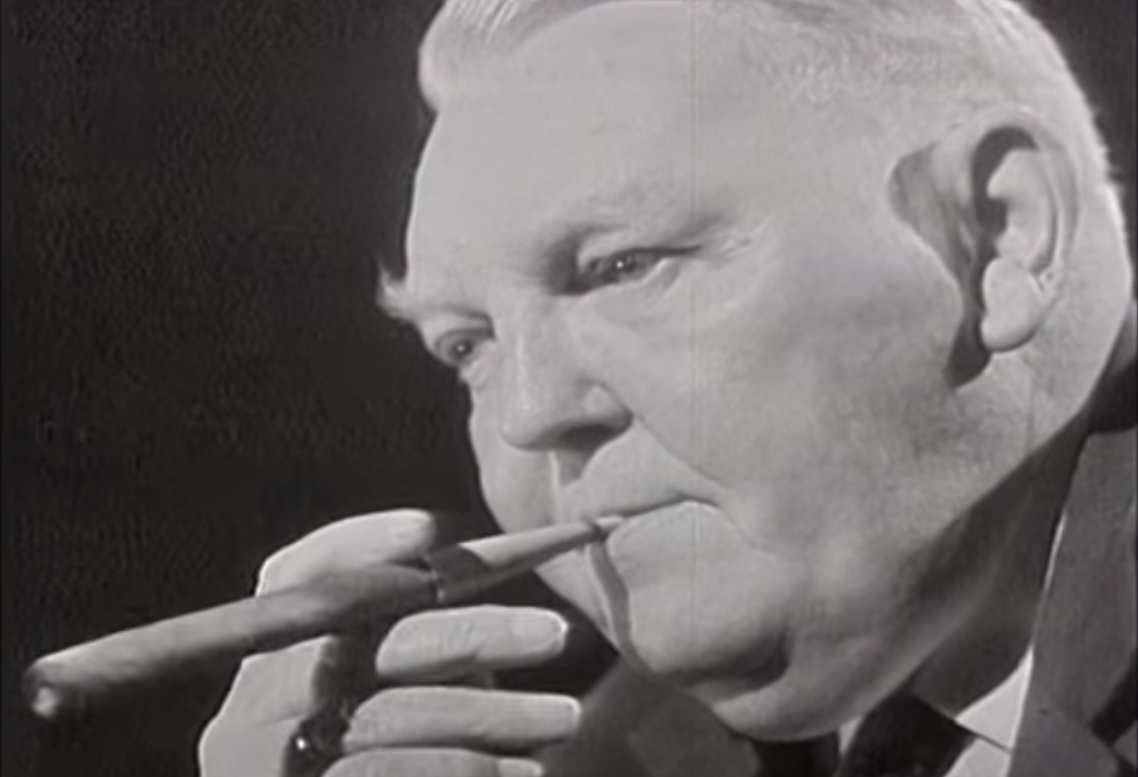In the wealthier countries around the Persian Gulf, gold can be eaten in all manner of ways. Injected into soups, dusted over fries, flaked on pizza, frosted on muffins… some hotels have to buy kilos of gold leaf every year to keep up with demand.
The Wall Street Journal wrote a piece on this “gastronomic gilded age” developing in places like Abu Dhabi earlier this year, under the headline “Are Those Gold Teeth or Did You Just Eat in the Gaudiest Place on Earth?”
The closest I’ve been to such golden excesses was at a tobacconist in Mayfair where they were selling a cigar wrapped in 24 carat gold leaf. It wasn’t a wrapper to be taken off either; you were supposed to burn it and smoke it down like any other cigar. These “golden torpedoes” were originally made to celebrate the release of Scarface, for those with a budget to match its protagonist.
Ludwig Erhard, the gentleman pictured above, did not smoke golden cigars. But if anyone deserved to, he did. And he smoked a lot.
That still is taken from an interview a little over a decade after he committed one of the boldest actions in modern economic history, which in turn led to no less than an “economic miracle”.
When they doubted him he was known as “der Dicke”, or “the Fatty”. Then, it was “der Optimist mit der Zigarre”, “the optimist with the cigar”. But once his work was done, he’d ascended to the status of “Mr Wirtschaftswunder” – Mr Economic Miracle himself.
And this wasn’t hyperbole; in one action, he erased the stagnation that plagued the ruined West German economy following the end of World War II, and initiated an era of massive prosperity.
His talents didn’t end there. He had a superhuman nicotine tolerance to boot. If you’ve ever smoked a full bodied cigar, you’ll know they can knock you for six if you puff ‘em too hard.
But in that interview pictured above, he smokes through two “torpedos” alone, and comments to the interviewer that he smokes from dawn until dusk. Not 24ct gold perhaps, but “Handelsgold” – a cigar brand that exists to this day and associates itself with Erhard similarly to how other cigar makers make “Churchill” size cigars.
Germany’s “no-deal exit” of 1948
Erhard’s miracle, though incredibly effective, was also incredibly simple, and one totally alien to the solutions presented by those in power today.
He didn’t run the printing presses like Ben Bernanke at the Federal Reserve and call it “the courage to act”…
He didn’t run the printing presses and talk about the importance of self-belief in the context of Peter Pan like Haruhiko Kuroda in Japan…
And nor did he declare “whatever it takes” while running the printing presses like Mario Draghi…
Erhard’s magic didn’t involve the printing press at all, as our modern “miracles”. In fact, he didn’t really intervene in the economy at all – quite the opposite.
Germany in 1948 was under the yoke of massive regulation and price controls, which had begun under the Nazis during the war but was continued by the victorious allied occupation in the name of maintaining stability.
Erhard’s gambit, as a free-marketeer hiding within the Allied regime, was to go on the radio over a weekend and suddenly announce that all such price controls had been abolished. He didn’t trust any public servant to work on a weekend, which gave him a head start.
By the time the allied occupation was in a position to reinstate those controls, the Germany economy was already beginning to recover and accelerate. His impromptu radio broadcast would begin an economic boom that would last for over a decade.
You won’t see Erhard lauded much these days, as our economies become ever more centralised. Erhard’s Wikipedia entry contains only two sentences on his economic miracle:
All the best,
Boaz Shoshan
Editor, Capital & Conflict
Category: Market updates



